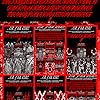A.R. LaBaere?
asked
B.P. Gregory:
Hello, Would you consider Lovecraft to be an influence on your work? From what I have observed so far, many of your themes strike me as cosmic in nature. If so, would you consider your writings to be as cynical as the philosophy of Cosmicism? As you have listed House of Leaves as an influence, do you consider that novel to have cosmic horror implications about the universe and mankind?
B.P. Gregory
Hi A.R., good question!
It's difficult to kneel at the altar of horror these days and not feel Lovecraft's hand on your shoulder. My father took "reading to the kids" as including us on whatever he was into, so from a very young age my brain got lashings of Herbert, Wheatley, Lovecraft, etc. An underlying mythos does touch all the stories I've written, short and long, and the more you read the tighter the threads gather.
I especially love the nauseating threat of the inexplicable. An event so far out of a character's terroir that it breaks their brain trying to reconcile it.
But my point of divergence from Cosmicism is my interest in the frail squishy person who finds themselves caught up in forces beyond ken, micro over macro. Rather than being indifferent to the crawling ants my environments are often warped by what human obsessions play out on them (perhaps a touch of Emily Bronte). For those who have faith, in a deity or in each other, it acts as a bracing force for the spirit. Horror is leavened with absurdity and humour: while some characters aquiesce to suffering like lambs or even hurl themselves up the slaughterhouse ramp, their fellows choose to laugh over weeping.
House of Leaves is one of those magical reads that lends itself beautifully to interpretation and personal philosophy - like an empty room, it invites the occupant to bring colour and meaning. I found that the story spoke to me about the individual person's ability to redeem or damn themselves and their limitations in the face of cosmic horror, of an ungraspable truth.
I hope this answers your question but feel free to ask more if I haven't covered it, I would love to hear what you took from House of Leaves.
It's difficult to kneel at the altar of horror these days and not feel Lovecraft's hand on your shoulder. My father took "reading to the kids" as including us on whatever he was into, so from a very young age my brain got lashings of Herbert, Wheatley, Lovecraft, etc. An underlying mythos does touch all the stories I've written, short and long, and the more you read the tighter the threads gather.
I especially love the nauseating threat of the inexplicable. An event so far out of a character's terroir that it breaks their brain trying to reconcile it.
But my point of divergence from Cosmicism is my interest in the frail squishy person who finds themselves caught up in forces beyond ken, micro over macro. Rather than being indifferent to the crawling ants my environments are often warped by what human obsessions play out on them (perhaps a touch of Emily Bronte). For those who have faith, in a deity or in each other, it acts as a bracing force for the spirit. Horror is leavened with absurdity and humour: while some characters aquiesce to suffering like lambs or even hurl themselves up the slaughterhouse ramp, their fellows choose to laugh over weeping.
House of Leaves is one of those magical reads that lends itself beautifully to interpretation and personal philosophy - like an empty room, it invites the occupant to bring colour and meaning. I found that the story spoke to me about the individual person's ability to redeem or damn themselves and their limitations in the face of cosmic horror, of an ungraspable truth.
I hope this answers your question but feel free to ask more if I haven't covered it, I would love to hear what you took from House of Leaves.
More Answered Questions
About Goodreads Q&A
Ask and answer questions about books!
You can pose questions to the Goodreads community with Reader Q&A, or ask your favorite author a question with Ask the Author.
See Featured Authors Answering Questions
Learn more



